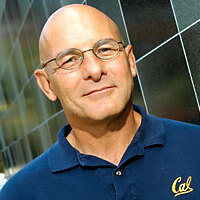Related Research Articles

David Andrew Patterson is an American computer pioneer and academic who has held the position of professor of computer science at the University of California, Berkeley since 1976. He announced retirement in 2016 after serving nearly forty years, becoming a distinguished software engineer at Google. He currently is vice chair of the board of directors of the RISC-V Foundation, and the Pardee Professor of Computer Science, Emeritus at UC Berkeley.
Kanianthra Mani Chandy is the Simon Ramo Professor of Computer Science at the California Institute of Technology (Caltech). He has been the Executive Officer of the Computer Science Department twice, and he has been a professor at Caltech since 1989. He also served as Chair of the Division of Engineering and Applied Science at the California Institute of Technology.

Eric Allen Brewer is professor emeritus of computer science at the University of California, Berkeley and vice-president of infrastructure at Google. His research interests include operating systems and distributed computing. He is known for formulating the CAP theorem about distributed network applications in the late 1990s.
Michael Burrows, FRS is a British computer scientist and the creator of the Burrows–Wheeler transform, currently working for Google. Born in Britain, as of 2018 he lives in the United States, although he remains a British citizen.
Stefan Savage is an American computer science researcher, currently a Professor in the Systems and Networking Group at the University of California, San Diego. There, he holds the Irwin and Joan Jacobs Chair in Information and Computer Science. Savage is widely cited in computer security, particularly in the areas of email spam, network worms and malware propagation, distributed denial of service (DDOS) mitigation and traceback, automotive hacking and wireless security. He received his undergraduate degree at Carnegie Mellon and his Ph.D. from the University of Washington (2002).
Jonathan Shields Turner is a senior professor of Computer Science in the School of Engineering and Applied Science at Washington University in St. Louis. His research interests include the design and analysis of high performance routers and switching systems, extensible communication networks via overlay networks, and probabilistic performance of heuristic algorithms for NP-complete problems.

Mendel Rosenblum is a professor of Computer Science at Stanford University and co-founder of VMware.
Fred Barry Schneider is an American computer scientist, based at Cornell University, where he is the Samuel B. Eckert Professor of Computer Science. He has published in numerous areas including science policy, cybersecurity, and distributed systems. His research is in the area of concurrent and distributed systems for high-integrity and mission-critical applications.
Hari Balakrishnan is the Fujitsu Professor of Computer Science and Artificial Intelligence in the Department of Electrical Engineering and Computer Science at MIT, and the Co-founder and CTO at Cambridge Mobile Telematics.

Ion Stoica is a Romanian–American computer scientist specializing in distributed systems, cloud computing and computer networking. He is a professor of computer science at the University of California, Berkeley and co-director of AMPLab. He co-founded Conviva and Databricks with other original developers of Apache Spark.

Jeffrey Adgate "Jeff" Dean is an American computer scientist and software engineer. Since 2018, he has been the lead of Google AI. He was appointed Alphabet's chief scientist in 2023 after a reorganization of Alphabet's AI focused groups.
Kenneth P. Birman is a professor in the Department of Computer Science at Cornell University. He currently holds the N. Rama Rao Chair in Computer Science.
Marinus Frans (Frans) Kaashoek is a Dutch computer scientist, entrepreneur, and Charles Piper Professor at the Massachusetts Institute of Technology.

Albert Y. Zomaya is currently the Chair Professor of High Performance Computing & Networking and Australian Research Council Professorial Fellow in the School of Information Technologies, The University of Sydney. He is also the Director of the Centre for Distributed and High Performance Computing. He is currently the Editor in Chief of IEEE Transactions on Sustainable Computing and Springer's Scalable Computing and Communications. He was past Editor in Chief of the IEEE Transactions on Computers.
Yuanyuan (YY) Zhou is a Chinese and American computer scientist and entrepreneur. She is a professor of computer science and engineering at the University of California, San Diego, where she holds the Qualcomm Endowed Chair in Mobile Computing. Her research concerns software reliability, including the use of data mining to automatically detect software bugs and flexible system designs that can adapt to hardware platform variations. She is also the founder of three start-up companies, Emphora, Pattern Insight, and Whova.
Dawson R. Engler is an American computer scientist and an associate professor of computer science and electrical engineering at Stanford University.

Michael J. Freedman is an American computer scientist who is the Robert E. Kahn Professor of Computer Science at Princeton University, where he works on distributed systems, networking, and security. He is also the cofounder of database company Timescale.

David Notkin was an American software engineer and professor of computer science.
Andrea Carol Arpaci-Dusseau is an American computer scientist interested in operating systems, file systems, data storage, distributed computing, and computer science education. She is a professor of computer sciences at the University of Wisconsin–Madison.
Karin Strauss is a Brazilian-American computer engineer, a senior principal research manager at Microsoft Research, and an affiliate professor in the Paul G. Allen School of Computer Science and Engineering at the University of Washington. Her research concerns computer architecture, green computing, and unconventional computing including DNA digital data storage.
References
- 1 2 Jennifer Langston (February 8, 2016). "UW's Tom Anderson elected to National Academy of Engineering". UW Today. University of Washington. Retrieved 18 January 2017.
- ↑ "The Mark Weiser Award". ACM SIGOPS. Retrieved 5 July 2019.
- ↑ Ascribe Newswire Via Thomson Dialog NewsEdge (2006-01-10). "ACM, the Association for Computing Machinery, Names 34 Fellows for Contributions to Computing and IT; Winners Represent Leading Industries, Research Labs, Universities". Cable Spotlight. Retrieved 2013-04-30.
- ↑ IEEE (2013). "IEEE Koji Kobayashi Computers and Communications Award Recipients". IEEE. Retrieved 2013-04-30.